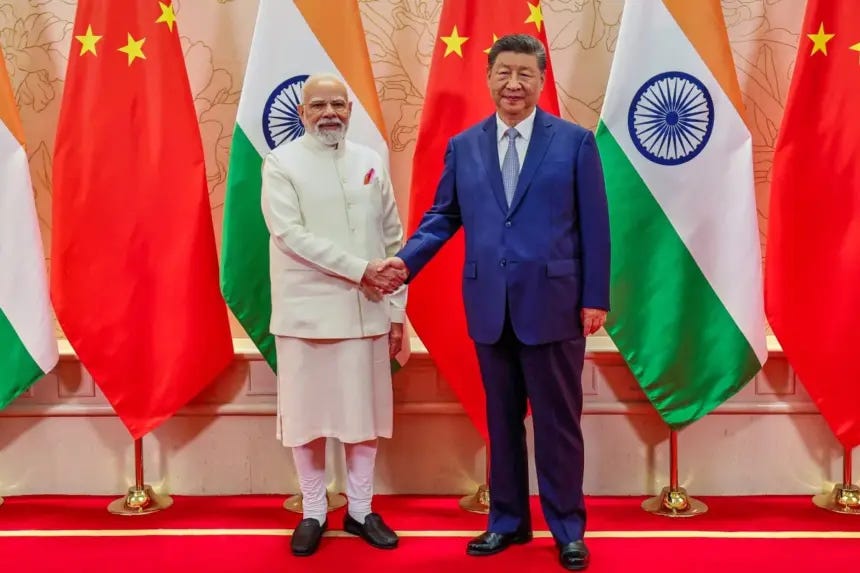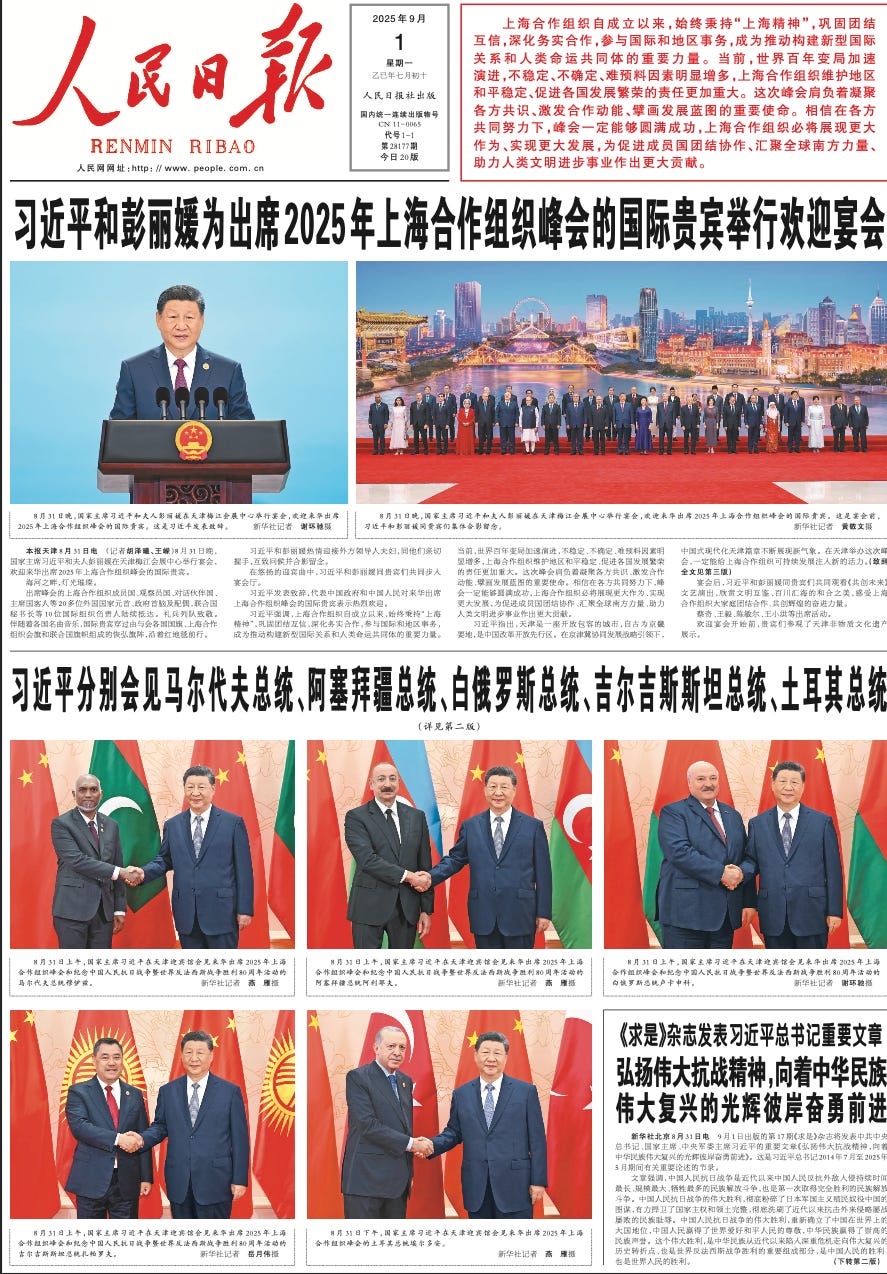Asia Communique
Xi-Modi Summit Signals Fragile Reset | Prabowo Cuts Perks Amid Deadly Protests | U.S. Tightens Controls on Samsung, SK Hynix
Hello Readers,
Asia Communique brings you the latest from Shanghai Cooperation Organization (SCO) Summit in Tianjin — and other major stories from Asia.
I will have another edition of the newsletter later today.
Dragon Meets Elephant: Xi-Modi Summit Signals Fragile Reset
Chinese President Xi Jinping met with Indian Prime Minister Narendra Modi on August 31, 2025, at the Tianjin Guesthouse on the sidelines of the Shanghai Cooperation Organization (SCO) Summit. This was Modi’s visit to China in seven years, signaling a possible recalibration in bilateral relations amid mounting frictions with Washington.
Xi noted that since their successful meeting in Kazan last year, China-India relations had “restarted and set out on a new journey,” with continuous progress in exchanges and cooperation. He emphasized that China and India are two great Eastern civilizations, the two most populous countries in the world, and key members of the Global South, carrying an important responsibility to improve the well-being of their peoples, promote solidarity among developing nations, and advance human progress.
“It is the right choice for China and India to be friendly neighbors, partners who enable each other’s success, and to realize the vision of the ‘dragon and elephant dancing together.’”
Xi highlighted that this year marks the 75th anniversary of the establishment of diplomatic relations between China and India and called for the two countries to take a strategic and long-term view of their ties, leveraging the Tianjin meeting to elevate the relationship and ensure its stable, healthy, and sustainable development.
He outlined four key priorities:
Strengthen Strategic Communication and Mutual Trust
“As long as we stay the course of being partners, not rivals, and see each other as opportunities for development, not threats, China-India relations can stay on track and move forward steadily over the long term.”
Expand Exchanges and Cooperation for Mutual Benefit
“China and India are both at critical stages of national rejuvenation. We should focus on development as our largest common denominator, support each other, advance together, and enable mutual success.”
Respect Core Concerns and Maintain Good Neighborliness
“The Five Principles of Peaceful Coexistence, advocated by our elder leaders more than 70 years ago, must be cherished and upheld. We should work together to maintain peace and stability in the border areas and not allow boundary issues to define the overall China-India relationship.”
Enhance Multilateral Coordination and Defend Shared Interests
“China and India should demonstrate our historical responsibility, uphold multilateralism, strengthen coordination on major international and regional issues, defend international fairness and justice, and work together to promote a multipolar world and greater democracy in international relations—making due contributions to the peace and prosperity of Asia and the world.”
Now, Modi and Xi’s meeting didn’t get a great deal of exclusive coverage in Chinese state media. Most of the news coverage was focused on Shanghai Cooperation Organization rather than the bilateral relationship with India. That was somewhat expected as neither did Vladimir Putin get any major attention.
The above mentioned People’s Daily print edition didn’t even carry a photo of handshake between Modi and Xi. No photo of handshake with Putin either.
In Tianjin, Politburo Standing Committee member Cai Qi met Prime Minister Narendra Modi on the sidelines of the SCO Summit, following Modi’s high-profile meeting with President Xi Jinping.
Cai said Xi and Modi reached “new important consensuses” that provide “clear direction” for advancing bilateral cooperation. He pledged that Beijing would work with New Delhi to implement the leaders’ agreements, enhance party-to-party exchanges, promote mutual trust, and manage differences constructively.
Modi welcomed the resumption of inter-party mechanisms and called the 75th anniversary of diplomatic ties a “milestone,” expressing India’s readiness to work with China to deepen cooperation and jointly promote peace and development.
A Chinese scholar has offered an analysis of why India is seeking a reset with China. Here’s a key excerpt, and I’ll share the full translation in the next edition.
The underlying logic of India-U.S. relations has long rested on their shared goal of containing China. The current developments suggest that this foundation is beginning to weaken.
Previously, India maintained its position as a “swing state”, carefully avoiding openly aligning with the U.S. to contain China, while also unwilling to unilaterally appease Beijing.
However, Washington’s attempts to improve relations with China would directly undermine the shared objectives and strategic partnership between India and the U.S. This would effectively strip India of its biggest bargaining chip in political and economic negotiations with Washington.
In this context, India’s best move is to proactively improve its relations with China in order to secure strategic leverage and gain the initiative in great-power competition.
Prabowo Bows to Public Pressure, Cuts Lawmakers’ Perks Amid Deadly Protests
Indonesian President Prabowo Subianto has pledged to revoke controversial lawmakers’ perks, including a $3,000 monthly housing allowance, after five days of nationwide protests left six people dead and deepened political unrest.
Speaking at a televised press conference in Jakarta alongside leaders from eight political parties, Prabowo announced that housing allowances will be scrapped and overseas trips suspended under a new moratorium effective Monday. The rare concession follows mounting public anger over revelations that all 580 lawmakers received an allowance nearly ten times Jakarta’s minimum wage.
The protests escalated after the death of Affan Kurniawan, a 21-year-old ride-hailing driver run over by a police vehicle during demonstrations. Prabowo met Kurniawan’s family over the weekend and confirmed that seven officers are under investigation.
While reaffirming his commitment to freedom of expression, Prabowo warned against “anarchic” acts that threaten public safety, cautioning that violent unrest could amount to treason or terrorism.
Prabowo also cancelled a planned China visit, meeting instead with religious leaders and opposition figures, including former president Megawati Sukarnoputri, in a bid to contain the crisis.
“I sincerely ask all citizens to trust the government and remain calm,” Prabowo said.
Washington Tightens Grip on Samsung, SK Hynix’s China Operations
The U.S. Commerce Department on Friday moved to revoke special authorizations that allowed Samsung Electronics and SK Hynix to ship American semiconductor equipment to their factories in China, forcing the South Korean chipmakers to now apply for case-by-case licenses from the Trump administration.
The move reverses 2023 waivers granted under former President Biden and signals a harder line in Washington’s bid to wall off Beijing from advanced semiconductor technology critical for artificial intelligence and high-performance computing. The change takes effect in 120 days.
The decision threatens to disrupt the global supply chain as Samsung and SK Hynix — which dominate memory chip production — rely heavily on China’s advanced manufacturing ecosystem. Analysts warn that restricting access to U.S. equipment could erode their competitiveness against rivals like Micron.
The timing adds friction to ongoing U.S.–South Korea trade negotiations. President Donald Trump met this week with South Korean President Lee Jae Myung, but talks remain inconclusive.
Meanwhile, Trump has also floated 100% tariffs on foreign semiconductors, sparking fears of wider supply-chain turmoil — though exemptions are expected for companies investing in U.S.-based fabs.
“We will maintain close communication with both governments and minimize impact on our business,” SK Hynix said.
Thank you for reading!



